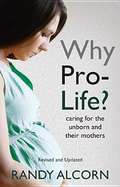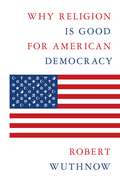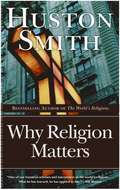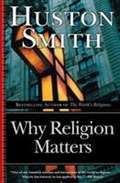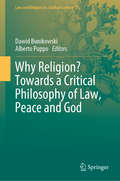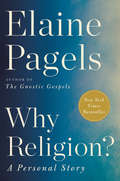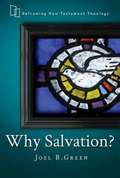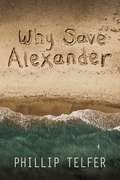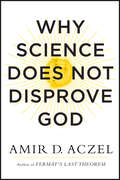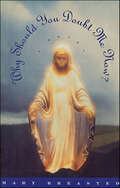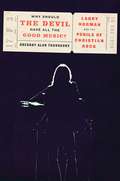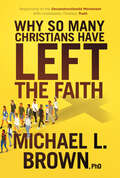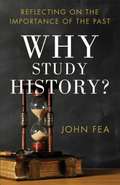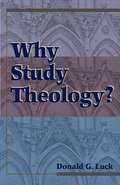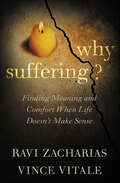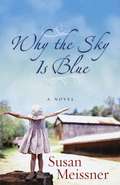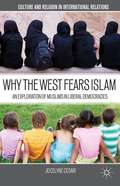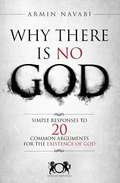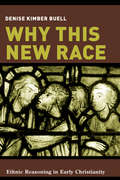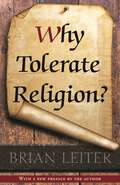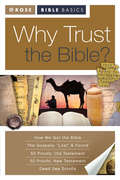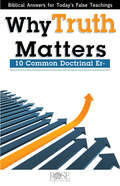- Table View
- List View
Why Pro-life?: Caring For The Unborn And Their Mothers
by Randy Alcorn"Why Pro-Life?" offers factual answers to the central issues of the abortion debate in a concise, non-abrasive way. Infused with grace and compassion, and grounded in medical science and psychological studies, Randy Alcorn presents a solid case for defending both unborn children and their mothers. Chapters such as, "What Makes a Human Life 'Meaningful, '" "Is Abortion Really a Women's Rights Issue," and "How Can I Help Unborn Babies and Their Mothers" help readers to look at the many sides of this polarizing issue. For those on the fence in the midst of the abortion debate, this book will be a great resource as it clearly and thoroughly examines the pro-life position. For those who are pro-life already, this book is an encouragement to be intelligently and graciously informed.
Why Religion Is Good for American Democracy
by Robert WuthnowHow the actions and advocacy of diverse religious communities in the United States have supported democracy’s development during the past centuryDoes religion benefit democracy? Robert Wuthnow says yes. In Why Religion Is Good for American Democracy, Wuthnow makes his case by moving beyond the focus on unifying values or narratives about culture wars and elections. Rather, he demonstrates that the beneficial contributions of religion are best understood through the lens of religious diversity. The religious composition of the United States comprises many groups, organizations, and individuals that vigorously, and sometimes aggressively, contend for what they believe to be good and true. Unwelcome as this contention can be, it is rarely extremist, violent, or autocratic. Instead, it brings alternative and innovative perspectives to the table, forcing debates about what it means to be a democracy.Wuthnow shows how American religious diversity works by closely investigating religious advocacy spanning the past century: during the Great Depression, World War II, the civil rights movement, the debates about welfare reform, the recent struggles for immigrant rights and economic equality, and responses to the coronavirus pandemic. The engagement of religious groups in advocacy and counteradvocacy has sharpened arguments about authoritarianism, liberty of conscience, freedom of assembly, human dignity, citizens’ rights, equality, and public health. Wuthnow hones in on key principles of democratic governance and provides a hopeful yet realistic appraisal of what religion can and cannot achieve.At a time when many observers believe American democracy to be in dire need of revitalization, Why Religion Is Good for American Democracy illustrates how religious groups have contributed to this end and how they might continue to do so despite the many challenges faced by the nation.
Why Religion Matters
by Huston SmithHuston Smith, the author of the classic bestseller The World's Religions, delivers a passionate, timely message: The human spirit is being suffocated by the dominant materialistic worldview of our times. Smith champions a society in which religion is once again treasured and authentically practiced as the vital source of human wisdom.
Why Religion Matters
by Huston SmithHuston Smith, the author of the classic bestseller The World's Religions, delivers a passionate, timely message: The human spirit is being suffocated by the dominant materialistic worldview of our times. Smith champions a society in which religion is once again treasured and authentically practiced as the vital source of human wisdom.
Why Religion Matters: The Fate of the Human Spirit in an Age of Disbelief
by Huston SmithHuston Smith, the author of the classic bestseller The World's Religions, delivers a passionate, timely message: The human spirit is being suffocated by the dominant materialistic worldview of our times. Smith champions a society in which religion is once again treasured and authentically practiced as the vital source of human wisdom.
Why Religion? Towards a Critical Philosophy of Law, Peace and God (Law and Religion in a Global Context #2)
by Dawid Bunikowski Alberto PuppoThis book examines the relation between religion and jurisprudence, God, and peace respectively. It argues that in order to elucidate the possible role religion can play in the contemporary world, it is useful to analyse religion by associating it with other concepts. Why peace? Because peace is probably the greatest promise made by religions and the greatest concern in the contemporary world. Why jurisprudence? Because, quoting Kelsen’s famous book "Peace through Law", peace is usually understood as something achievable by international legal instruments. But what if we replace "Peace through Law" with "Peace through Religion"? Does law, as an instrument for achieving peace, incorporate a religious dimension? Is law, ultimately, a religious and normative construction oriented to peace, to the protection of humanity, in order to keep humans from the violence of nature? Is the hope for peace rational, or just a question of faith? Is religion itself a question of faith or a rational choice? Is the relatively recent legal concept of “responsibility to protect” a secular expression of the oldest duty of humankind?The book follows the structure of interdisciplinary research in which the international legal scholar, the moral philosopher, the philosopher of religion, the theologian, and the political scientist contribute to the construction of the necessary bridges. Moreover, it gives voice to different monotheistic traditions and, more importantly, it analyses religion in the various dimensions in which it determines the authors' cultures: as a set of rituals, as a source of moral norms, as a universal project for peace, and as a political discourse.
Why Religion?: A Personal Story
by Elaine PagelsOne of PW’s Best Books of the YearOne of Amazon’s Best Books of the MonthWhy is religion still around in the twenty-first century? Why do so many still believe? And how do various traditions still shape the way people experience everything from sexuality to politics, whether they are religious or not? In Why Religion? Elaine Pagels looks to her own life to help address these questions.These questions took on a new urgency for Pagels when dealing with unimaginable loss—the death of her young son, followed a year later by the shocking loss of her husband. Here she interweaves a personal story with the work that she loves, illuminating how, for better and worse, religious traditions have shaped how we understand ourselves; how we relate to one another; and, most importantly, how to get through the most difficult challenges we face. Drawing upon the perspectives of neurologists, anthropologists, and historians, as well as her own research, Pagels opens unexpected ways of understanding persistent religious aspects of our culture. A provocative and deeply moving account from one of the most compelling religious thinkers at work today, Why Religion? explores the spiritual dimension of human experience.
Why Religions Matter
by John BowkerWhat are religions? Why is it important to understand them? One answer is that religions and religious believers are extremely bad news: they are deeply involved in conflicts around the globe; they harm people of whom they disapprove; and they often seem irrational. Another answer claims that they are in fact extremely good news: religious beliefs and practices are universal and so fundamental in human nature that they have led us to great discoveries in our explorations of the cosmos and of who we are. The sciences began as part of that religious exploration. John Bowker demonstrates that there is truth in both answers and that we need both to understand what religion is and why it matters. He draws on many disciplines - from physics, genetics and the neurosciences to art, anthropology and the history of religions - to show how they shed entirely new light on religion in the modern world.
Why Salvation? (Reframing New Testament Theology)
by Joel B. GreenSalvation is the bedrock of our faith and the touchstone for faithful living. It is the good news of God drawing near to us as individuals but also as communities of faith. This book helps us understand that when we say "Jesus saves," we stand on scripture that proclaims a God who, through Jesus, heals, liberates, and rescues. Like each generation that has gone before, we too must find our own awareness and then respond and participate in God’s work as transformed people, serving together as the Body of Christ, who have also signed up for ongoing, personal and social transformation.This book is an invitation to a journey of salvation oriented toward increased understanding but also to transformed commitments, renewed allegiances, and fresh practices. To address the grand narrative of Scripture in a way that takes seriously its essential focus on the journey of salvation is to open ourselves to fresh (and perhaps refreshed) perspectives on the world and, thus, on life in the world. In this book Joel Green show how salvation can illumine new categories for conceiving the world, for making sense of our experiences, and for directing our lives.
Why Save Alexander
by Phillip TelferCan a hardcore gamer survive a real-world crisis? Seventeen-year-old Alex Brooks is obsessed with becoming an e-athlete. What teen wouldn&’t want to make a million dollars playing video games professionally? Especially if you&’ve got a real shot at it like Alex. His mom, a television producer in Hollywood, casts her son in a reality show about young gaming hopefuls seeking fame and fortune. This gives him great exposure in the industry. On top of that, His dad owns an up-and-coming tech business that is about to launch a revolutionary product. Life couldn&’t be better--or could it?Truth be told, Alex doesn&’t need to go pro as bad as he needs to grow up, and what teen really wants to do that? He&’s popular with other gamers but his over-inflated ego makes him obnoxious to almost everyone else. He hides a deep secret--the cavernous void in his life that nothing seems to fill. He thrives on a false sense of accomplishment but is haunted by an inescapable sense of loneliness. He has lived in the shadow of his dad&’s relentless pursuit of building a tech empire while watching him fail to keep his family from falling apart. What will it take for Alex to gain a new perspective on what it means to become a man and what it takes to be a hero?Everything changes when Alex goes missing. He must face a life or death struggle in a foreign culture that doesn&’t have a power grid. Man or computer mouse? His digital world didn&’t prepare him for the challenges that are about to confront him. Alex is not ready to rescue anyone, he needs to be rescued. For those who really know Alexander, why would anyone want to save him? This coming-of-age story follows Alex as he is forced to grow up the hard way through extraordinary circumstances, which cause him to re-evaluate what&’s important in life, his need for God, and the positive influence of older mentors. Adventure, danger, romance, survival, despair and Providence are the ingredients that help remake his life.
Why Science Does Not Disprove God
by Amir D. AczelThe bestselling author “wields impressive intellectual weapons in demolishing the New Atheists’ claims that science has disproven the existence of God” (Booklist, starred review).The renowned science writer, mathematician, and bestselling author of Fermat’s Last Theorem masterfully refutes the overreaching claims of the “New Atheists,” providing millions of educated believers with a clear, engaging explanation of what science really says, how there’s still much space for the Divine in the universe, and why faith in both God and empirical science are not mutually exclusive.A highly publicized coterie of scientists and thinkers, including Richard Dawkins, the late Christopher Hitchens, and Lawrence Krauss, have vehemently contended that breakthroughs in modern science have disproven the existence of God, asserting that we must accept that the creation of the universe came out of nothing, that religion is evil, that evolution fully explains the dazzling complexity of life, and more. In this much-needed book, science journalist Amir Aczel profoundly disagrees and conclusively demonstrates that science has not, as yet, provided any definitive proof refuting the existence of God.Why Science Does Not Disprove God is his brilliant and incisive analyses of the theories and findings of such titans as Albert Einstein, Roger Penrose, Alan Guth, and Charles Darwin, all of whose major breakthroughs leave open the possibility—and even the strong likelihood—of a Creator. Bolstering his argument, Aczel lucidly discourses on arcane aspects of physics to reveal how quantum theory, the anthropic principle, the fine-tuned dance of protons and quarks, the existence of anti-matter and the theory of parallel universes, also fail to disprove God.“[An] intelligent and stimulating book.” —The Washington Post
Why Should You Doubt Me Now?: A Novel
by Mary BreastedThe Virgin Mary had made an untoward appearance in Dublin. Is she real? Is she a hoax? Mary Breasted's gift for poking fun where it hurts the most has produced an irreverent, irrepressible, unforgettable book. Ireland will never be the same."Breasted's perfectly aimed dialogue and brisk action skewer the jumbled politics--sexual, religious and marital, in academia and the governing Dail--that shape life in modern Ireland." - Publishers Weekly
Why Should the Devil Have All the Good Music?: Larry Norman and the Perils of Christian Rock
by Gregory ThornburyThe riveting, untold story of the “Father of Christian Rock” and the conflicts that launched a billion-dollar industry at the dawn of America’s culture wars. In 1969, in Capitol Records' Hollywood studio, a blonde-haired troubadour named Larry Norman laid track for an album that would launch a new genre of music and one of the strangest, most interesting careers in modern rock. Having spent the bulk of the 1960s playing on bills with acts like the Who, Janis Joplin, and the Doors, Norman decided that he wanted to sing about the most countercultural subject of all: Jesus. Billboard called Norman “the most important songwriter since Paul Simon,” and his music would go on to inspire members of bands as diverse as U2, The Pixies, Guns ‘N Roses, and more. To a young generation of Christians who wanted a way to be different in the American cultural scene, Larry was a godsend—spinning songs about one’s eternal soul as deftly as he did ones critiquing consumerism, middle-class values, and the Vietnam War. To the religious establishment, however, he was a thorn in the side; and to secular music fans, he was an enigma, constantly offering up Jesus to problems they didn’t think were problems. Paul McCartney himself once told Larry, “You could be famous if you’d just drop the God stuff,” a statement that would foreshadow Norman’s ultimate demise. In Why Should the Devil Have all the Good Music?, Gregory Alan Thornbury draws on unparalleled access to Norman’s personal papers and archives to narrate the conflicts that defined the singer’s life, as he crisscrossed the developing fault lines between Evangelicals and mainstream American culture—friction that continues to this day. What emerges is a twisting, engrossing story about ambition, art, friendship, betrayal, and the turns one’s life can take when you believe God is on your side.
Why So Many Christians Have Left the Faith: Responding to the Deconstructionist Movement With Unshakable, Timeless Truth
by Michael L. BrownFROM THE BEST-SELLING AUTHOR OF JEZEBEL'S WAR WITH AMERICA, HYPER-GRACE, AND THE REAL KOSHER JESUSAt a time when the Bible and Christianity are considered untrustworthy, will we choose faith or follow the culture? This book will provide you with the facts and understanding you need to respond to difficult questions biblically and stay rooted in your faith even when others seem to be abandoning theirs. We are living in unprecedented times when Christian leaders are renouncing their faith and large numbers of believers are falling away. Is this the final apostasy prophesied by Jesus and Paul? And can we do anything to help those struggling with their faith? In Why So Many Christians Have Left the Faith, Dr. Michael L. Brown confronts the problem of &“Christian deconstruction&” with solid, faith-building answers and honest responses to difficult questions. He addresses:What the Bible says about an end-time falling away and whether that is what we are seeing in our day;How solidarity with and sympathy for the LGBT movement has brought with it a rejection of biblical values;The effect of leadership scandals on the credibility of the gospel;How the me-centered gospel is contributing to the current faith crisis by putting God on trial;The contemporary objections to the Bible&’s moral standards;The problem of pluralism; andWhat the Bible does and doesn&’t say about future punishment in hell, while also examining the scriptural statement that &“God is love.&”Looking at the stories of those who fell away as well as the larger cultural factors, this book offers solid answers to the major attacks against the Bible and helps readers build an unshakable faith.
Why Study History?: Reflecting On The Importance Of The Past
by John FeaWhat is the purpose of studying history? How do we reflect on contemporary life from a historical perspective and can such reflection help us better understand ourselves, the world around us, and the God we worship and serve? <p><p> In this introductory textbook, accomplished historian John Fea shows why Christians should study history, how faith is brought to bear on our understanding of the past, and how studying the past can help us more effectively love God and others. Deep historical thinking can relieve us of our narcissism; cultivate humility, hospitality, and love; and transform our lives more fully into the image of Jesus Christ.
Why Suffering?: Finding Meaning and Comfort When Life Doesn't Make Sense
by Ravi Zacharias Vince VitaleWhy would a loving and powerful God allow so much pain and suffering? In Why Suffering? Ravi Zacharias and Vince Vitale carefully walk you through a variety of responses that considered together provide a clear, comprehensive, and convincing answer. Responses like:Where there is the possibility of love, there has to be the reality of freedom, and therefore the possibility of pain. Wishing God had made a different world is to wish yourself out of existence. The cross is the key to a compelling and rational explanation for trusting in God in the face of suffering. In comparison with other world religions, the Christian response is highly distinctive. The reality of evil only makes sense in light of the reality of divine goodness. Relational knowledge about God takes the argument beyond reason to the presence of God amidst suffering. God's decision to allow temporal suffering is understandable when viewed from an eternal perspective. Divine goodness shows how to conquer not in spite of, but even through suffering. Here is a book written with great respect for the complexity of the issue, recognizing that some who read it will be in the trenches of deep suffering themselves and others questioning the very existence of a loving God. Why Suffering? provides an answer to the problem of pain and suffering with emotional sensitivity and intellectual integrity.
Why The Sky Is Blue
by Susan MeissnerWhat options does a Christian woman have after she's brutally assaulted by a stranger. . . and becomes pregnant? That's the heartrending situation Claire Holland faces. Happily married and the mother of two when she is attacked, Claire begins an incredible journey on the painful pathway to trusting God in all things. When Claire's husband, Dan, confesses he can't be a father to the expected child, Claire's decision to put the baby up for adoption creates a sense of tremendous loss for Claire. Later, unexpected circumstances turn this seeming loss into victory. This wonderful first novel isn't a love story. . . . but a life story, presenting the twin themes trusting God in tragic circumstances and reaping the rewards that eventually come with sacrificial loving.
Why The West Fears Islam
by Jocelyne CesariJocelyne Cesari examines the idea that Islam might threaten the core values of the West through testimonies from Muslims in France, Germany, the United Kingdom, the Netherlands, and the US. Her book is an unprecedented exploration of Muslim religious and political life based on several years of field work in Europe and in the United States.
Why There is No God: Simple Responses to 20 Common Arguments for the Existence of God
by Armin Navabi Nicki Hise• "Science can't explain the complexity and order of life; God must have designed it to be this way." • "God's existence is proven by scripture." • "There's no evidence that God doesn't exist." • "God has helped me so much. How could none of it be true?" • "Atheism has killed more people than religion, so it must be wrong!" How many times have you heard arguments like these for why God exists? Why There Is No God provides simple, easy-to-understand counterpoints to the most popular arguments made for the existence of God. Each chapter presents a concise explanation of the argument, followed by a response illustrating the problems and fallacies inherent in it. Whether you're an atheist, a believer or undecided, this book offers a solid foundation for building your own inquiry about the concept of God.
Why This New Race: Ethnic Reasoning in Early Christianity
by Denise BuellWhy This New Race offers a radical new way of thinking about the origins of Christian identity. Conventional histories have understood Christianity as a religion that from its beginnings sought to transcend ethnic and racial distinctions. Denise Kimber Buell challenges this view by revealing the centrality of ethnicity and race in early definitions of Christianity. Buell's readings of various texts consider the use of "ethnic reasoning" to depict Christianness as more than a set of shared religious practices and beliefs. By asking themselves, "Why this new race?" Christians positioned themselves as members of an ethnos or genos distinct from Jews, Romans, and Greeks. Buell focuses on texts written before Christianity became legal in 313 C.E., including Greek apologetic treatises, martyr narratives, and works by Clement of Alexandria, Origen, and Tertullian. Philosophers and theologians used ethnic reasoning to define Christians as a distinct people within classical and ancient Near East society and in intra-Christian debates about what constituted Christianness. Many characterized Christianness as both fixed and fluid-it had a real essence (fixed) but could be acquired through conversion (fluid). Buell demonstrates how this dynamic view of race and ethnicity allowed Christians to establish boundaries around the meaning of Christianness and to develop universalizing claims that all should join the Christian people. In addressing questions of historiography, Buell analyzes why generations of scholars have refused to acknowledge ethnic reasoning in early Christian discourses. Moreover, Buell's arguments about the importance of ethnicity and religion in early Christianity provide insights into the historical legacy of Christian anti-Semitism as well as contemporary issues of race.
Why Tolerate Religion?: Updated Edition
by Brian LeiterWhy it's wrong to single out religious liberty for special legal protectionsThis provocative book addresses one of the most enduring puzzles in political philosophy and constitutional theory—why is religion singled out for preferential treatment in both law and public discourse? Why are religious obligations that conflict with the law accorded special toleration while other obligations of conscience are not? In Why Tolerate Religion?, Brian Leiter shows why our reasons for tolerating religion are not specific to religion but apply to all claims of conscience, and why a government committed to liberty of conscience is not required by the principle of toleration to grant exemptions to laws that promote the general welfare.
Why Tongues?
by Kenneth E. HaginKenneth Hagin believes that the infilling of the New Testament believers with the Holy Ghost should be the pattern for Christians today. In Part 1, he discusses speaking in tongues in the book of Acts of the Apostles to show that speaking in tongues was evidence of people being filled by the Holy Spirit. In Part 2, the author explains the 10 reasons why modern "Believers" should speak in tongues. To make his points, the author first quotes Biblical scriptures and then explains them in terms of his Christian, theological understanding.
Why Trust the Bible?
by Rose PublishingRose Bible Basics series: Why Trust the Bible?Is the Bible an ancient document that has been tampered with? Has it been edited many times over the centuries and now is filled with errors? How can we know what the Bible really said when the originals no longer exist?Bestselling books that promote these doubts, such as Bart Ehrman's Misquoting Jesus: The Story Behind Who Changed the Bible and Why, are influencing today's news media, and these teachings are being treated as fact. Now is the time to address the topic of textual criticism in our churches and help Christians become better informed — ready to "defend the faith." "The Bible can be trusted," says author Dr. Timothy Paul Jones. The good news is that the Bible is reliable, even though it was hand copied and there are variations between texts. This ebook explains the variations and why they don’t affect the trustworthiness of the Scriptures.Dr. Jones' interest in this topic began many years ago when he came across these arguments in seminary. At first his faith was badly shaken and he wondered if he still believed. But as he dug deeper, he found answers. Dr. Jones shows the errors in critics'logic and facts —and does it in an easy-to-understand style with charts, diagrams, and explanations. This full-color ebook gives answers to the following claims by critics:•The Gospels were written long after Jesus lived by people who weren't eyewitnesses.•The stories about Jesus' life and death were not handed down reliably and not recorded accurately.•The Bible is full of textual errors, as proven by the Dead Sea Scrolls•The New Testament wasn't finalized until hundreds of years after Jesus and his disciples, so there could have been many other "Gospels" accepted and later rejected -- in addition to the four Gospels found in the Bible today.•The originals of the Bible are lost, therefore we have no way of knowing what it actually said.•The Bible was edited by people who had an "agenda" and changed many teachings.The chapter titles are How We Got the Bible; Dead Sea Scrolls; 100 Proofs for the Bible; Why Trust the Bible; 100 Prophecies Fulfilled by Jesus; and the Gospels "Lost" & Found.Full color, dozens of color photos and illustrations and charts.
Why Truth Matters: 10 Common Doctrinal Errors
by Rose PublishingWhat is truth, and how can we know? The Bible plainly reveals the errors and false teachings that Christians will be expected to identify and defend against. Learn to recognize the counterfeits through the light of God's truth. Christians often wonder why certain religious groups are called "cults" or are said to have "cultic teachings." The answer is fairly simple. The Scripture mentions 10 key Christian beliefs that cult leaders or aberrant teachers ignore or twist. You will learn each of these 10 beliefs and be able to give examples of truth vs. counterfeit teachings. The 10 Common Doctrinal Errors include: False Gospels, False Doctrine, False Gods, False Christs, False Spirits, False Prophets, False Apostles, False Teachers, False Visions, and False Miracles.
